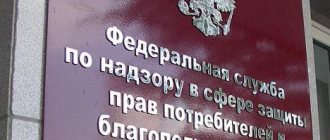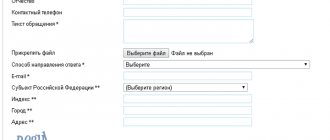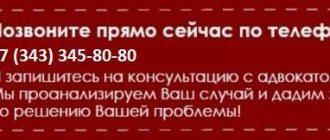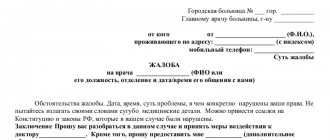○ Scope of activity of RosPotrebNadzor.
The Federal Service for Supervision of Consumer Rights Protection and Human Welfare (Rospotrebnadzor) is a federal executive body that carries out the functions of developing and implementing state policy and legal regulation in the field of consumer rights protection, developing and approving state sanitary and epidemiological rules and hygienic standards, as well as on the organization and implementation of federal state sanitary and epidemiological supervision and federal state supervision in the field of consumer protection. (Clause 1 of the Decree of the Government of the Russian Federation of April 30, 2004 No. 322).
The Federal Service for Supervision of Consumer Rights Protection and Human Welfare is the official name of Rospotrebnadzor, which is unknown to most citizens. Its functions are varied because it combines the functions of various departments. In particular, this organization:
- Carries out sanitary and epidemiological control of the activities of catering enterprises, as well as water bodies for compliance with established standards.
- Monitors the development of projects and further construction of buildings and regulates compliance with operational requirements.
- Checks the working conditions of employees of various organizations.
- Monitors air and soil conditions and ensures proper waste disposal.
- Monitors the activities of educational institutions.
- Checks the environmental situation, as well as the sanitary and epidemiological state of supervisory authorities.
- Monitors compliance with consumer rights and freedoms.
- Checks the compliance of objects with hygienic standards and issues appropriate conclusions.
- Conducts certification of workers whose activities require compliance with sanitary and epidemiological standards.
- Monitors the activities of its own departments and prepares statistical reports.
Authority
Rospotrebnadzor exercises the following powers:
- Monitoring compliance with requirements (sanitary, in the consumer market, when selling individual goods).
- Licensing (for certain types of activities from a special list).
- Registration (certain types of products and goods, substances not previously used in production, hazardous products).
- Determining the causes of mass infectious diseases and other epidemics.
- Informing executive authorities of the constituent entities of the Russian Federation about the epidemiological situation.
- Justification for the abolition or introduction of quarantine in the Russian Federation or its constituent entities.
- Implementation of sanitary and epidemiological monitoring throughout the country.
- Introduction of sanitary rules and standards.
- Carrying out inspections of organizations and entrepreneurs, considering appeals from the public.
○ Legislation on Rospotrebnadzor.
The activities of Rospotrebnadzor are approved by the Decree of the Government of the Russian Federation “On approval...” dated June 30, 2004 No. 322.
The main regulatory documents that regulate the activities of this service are:
- Law of the Russian Federation “On the Protection of Consumer Rights” dated 02/07/1992 No. 2300-1.
- Federal Law “On the Sanitary and Epidemiological Welfare of the Population No. dated March 30, 1999 No. 52-FZ.
- Federal Law “On the Quality and Safety of Food Products” dated January 2, 2000 No. 29-FZ.
- Federal Law “On Immunoprophylaxis of Infectious Diseases” dated September 17, 1998 No. 157-FZ.
- Federal Law “On Radiation Safety of the Population” dated 01/09/96 No. 3-FZ.
Also, Rospotrebnadzor must carry out its activities in accordance with the Constitution of the Russian Federation, acts of the President and Government of the Russian Federation, acts of the Ministry of Health and international treaties.
○ Who can Rospotrebnadzor check?
The greater the scope of control of the supervisory authority, the more organizations risk being subject to its inspection. In this case, Rospotrebnadzor is a leader that can inspect almost any enterprise.
However, most often organizations that work closely with the population (educational, trade, service sector) are audited. Thus, Rospotrebnadzor controls any activity related to consumer relations.
It is almost impossible to avoid an inspection if it has already been scheduled. The maximum that an enterprise can do is to minimize the risk of audits based on complaints from its employees or customers.
○ Procedure for carrying out verification.
When visiting an inspected enterprise, documentation is subject to audit. To present it, an official request is drawn up from Rospotrebnadzor, which is sealed with a copy of the inspection order.
At the same time, it is important to know that from 2021, the inspector does not have the right to request documents that can be checked independently, because they are in the state register (for example, TIN). If the required document is not freely available, you cannot avoid providing it - this will result in an administrative fine.
After the request, you have 10 days to prepare the requested documentation, a copy of which must be certified by your manager’s signature.
The audit itself begins with the inspector presenting his ID and an order about who and on what basis he will audit. The result of such an action is an inspection report, which lists the identified violations and makes recommendations for their elimination.
○ What does the territorial department of Rospotrebnadzor check?
At the request of citizens, the territorial department of Rospotrebnadzor can check:
- Documentation (medical and work records, educational documents).
- Documents confirming product quality (certificates, licenses, etc.).
- Check the cash register for proper operation.
- Control logs for correct filling.
- Premises to comply with sanitary and epidemiological standards.
Inspectors can draw up protocols and impose fines if violations are found, as well as give instructions for actions to eliminate the identified non-compliance with the law.
It is also possible to carry out test purchases to check quality, remove samples and specimens for inspection.
Powers of Rospotrebnadzor in the field of housing and communal services
What is good about checking a management organization by Rospotrebnadzor? Unlike GZHI, the powers of Rospotrebnadzor are broader and its leverage is more effective. This supervisory authority has the right to:
- check documents confirming the qualifications of employees;
- check the availability and quality of filling out various logs of control activities;
- evaluate the compliance of certificates and licenses with the activities being carried out;
- issue orders to eliminate violations and impose fines in relation to these violations;
- check contracts with the management company for infringement of the rights of one of the parties, and for compliance of contracts with legal norms;
- issue sanitary and epidemiological reports.
Thus, Rospotrebnadzor can solve most of the issues that state housing inspectors have difficulties with. If, after the GZHI’s response, there are more questions than answers, or if you believe that the problem falls within the scope of activity of Rospotrebnadzor, feel free to send your appeal there.
○ What documents need to be provided?
The verification is confirmed by an order, with which you must be familiarized with in advance. This document will contain a list of documents to be verified. During the audit, the employee looks at:
- Signs.
- Consumer corner.
- The cost of goods and services certified by the director.
- Founding documents.
- Agreement for waste removal and disinfection measures.
- Log books.
- Licenses to conduct the specified type of activity.
The listed documents are checked for compliance with legislative and regulatory acts and regulations.
○ What is beyond the competence of Rospotrebnadzor?
Despite all the powers available to Rospotrebnadzor employees, their capabilities are not unlimited. Thus, they do not have the right to the following actions:
- Carrying out a scheduled inspection without the presence of officials or their representatives (the exception is the presence of a threat to the life and health of citizens or representatives of flora/fauna).
- Seizure of original documents or a requirement to present documents not related to the inspection.
- Exceeding the inspection deadlines established by law.
- Selection and removal of samples or specimens for research beyond the powers established by the order.
- Issuance of instructions to legal entities and individual entrepreneurs to conduct control at their expense.
Organization of activities
The head of Rospotrebnadzor, the chief sanitary doctor, is appointed by the Government and is personally responsible for the implementation of its powers by the service. His deputies are also appointed by the Government.
The head of the service determines the responsibilities of his subordinates, makes proposals regarding their appointment or release from service, promotion and assignment of titles. Appoints employees of the central apparatus of the department, chief sanitary doctors in the constituent entities of the Russian Federation.
The head determines the staffing table of the central apparatus, approves the number and cost estimates for the maintenance of territorial bodies. In addition, the chief state sanitary doctor, interacting with the Ministry of Finance, makes proposals for budget formation.
○ Types of checks.
Rospotrebnadzor inspectors carry out different types of inspections.
✔ Scheduled checks.
This type of audit is carried out in accordance with the annual plan, which can be found on the official website of the department. There you can find information about when, by whom and in relation to whom the check will be carried out, as well as its duration.
The auditee must be notified of the planned audit no later than 3 days before its start by sending a registered letter with return receipt requested or by personal delivery of the document.
Scheduled inspections are carried out every three years.
✔ Unscheduled inspections.
Such checks are carried out in the following cases:
- The deadline for implementing the recommendations issued has expired.
- The department received an appeal from an individual.
- A violation of consumer rights has occurred.
If the application does not indicate specific facts of violation or it is submitted anonymously, the verification will be denied. It should also be taken into account that unscheduled inspections are valid only with the permission of the prosecutor's office, as a supervisory authority.
Notification of an unscheduled inspection must be given one day before its start. In emergency cases, its complete absence is allowed.
✔ On-site and documentary checks.
This type of inspection can be either scheduled or unscheduled. In the first case, the audit is carried out on-site; not only documentation is checked, but also equipment, premises, and territories.
A documentary check is carried out without a personal visit; the person being checked delivers the required documents to the department independently. If serious violations are identified, a repeat on-site inspection is possible.
Competence
When carrying out its activities, the agency does not have the right:
- carry out inspections without the presence of responsible persons of the organization, if there is no danger to the life of the population, state security, etc.;
- seize original documents and demand documentation for products that are not subject to inspection;
- exceed the inspection deadlines;
- take samples without drawing up the relevant acts;
- force the audited organization to carry out control activities at its own expense.
There is a limitation on the timing of inspections. For small organizations, a scheduled on-site inspection cannot be carried out for more than 50 hours, and for micro-enterprises - no more than 15 hours per year. For documentary and unscheduled inspections, the period should not exceed 20 working days. It is noteworthy that when determining the period, all types of inspections performed must be taken into account.









